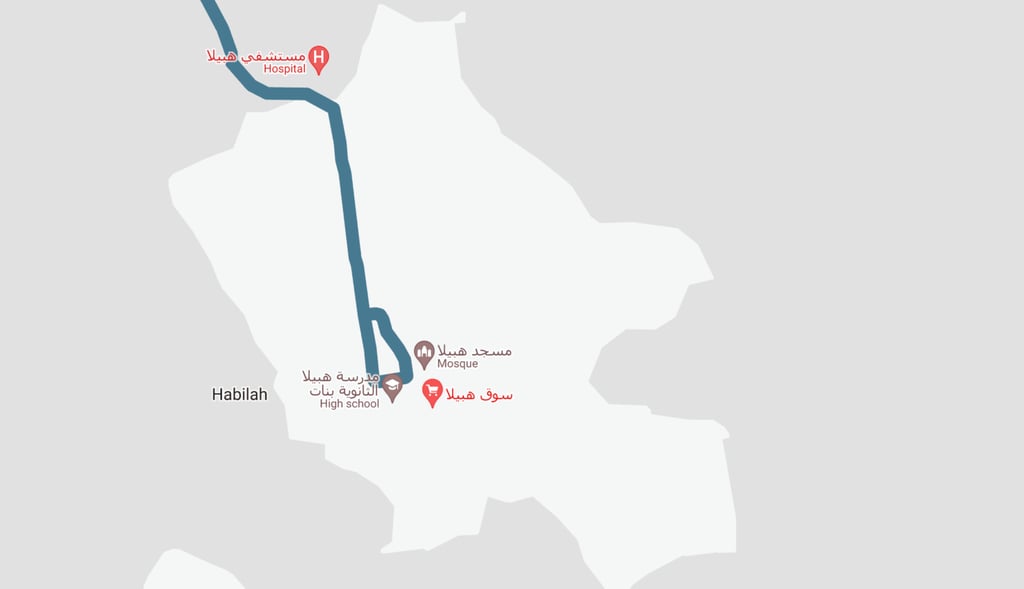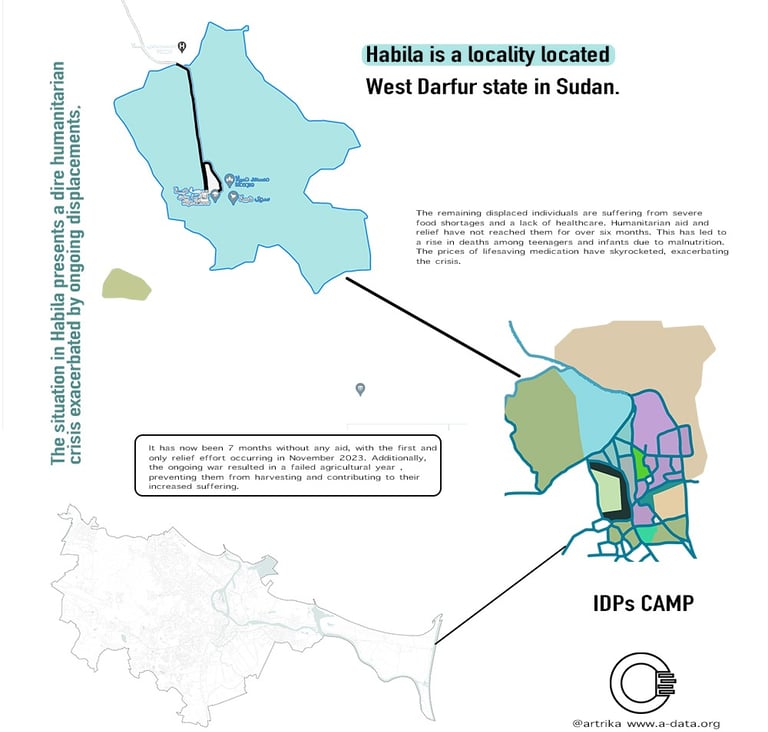Habila West Darfur State
A Community's Struggle - Displacement and Shortages of Fundamental Needs


Surviving in Habila
Habila is a locality located approximately 80 km south of El Geneina, the capital of West Darfur state in Sudan. This proximity makes it strategically significant and accessible yet also vulnerable to the border conflicts affecting the region and the displaced people have taken it as a refuge.It was affected by the Darfur war of 2003. The wars launched by the Sudanese government against citizens of Darfur using militias led to extensive looting and burning of the village forcing its people to flee to camps inside El Geneina, Abu Dhar, Karandak and Riyadh camps.These attacks were part of a broader campaign by government-aligned forces targeting non-Arab populations in Darfur, including the Masalit people.
After the situation stabilized over time, some returned but the majority did not. Those who returned to Habila, share the region with some nomadic tribes including Arab Rizeigat and Beni Halba, who took lands in Habila and settled there. Additionally, significant displacement continued from surrounding villages in all directions south, east, west and north of Habila. The village itself was also subjected to looting by Janjaweed.
During the Darfur war of 2003, there were four camps for displaced people, namely Shaytilat, Al-Salam, Al-Jamea, and Camps. Due to the ongoing conflict and violence, most of the camps for displaced people have disappeared, leaving only one camp, the seedling camp,which remains in the same condition as it was. This exacerbates the humanitarian crisis in Habila,leaving Its people in a state of desperation.
The situation of displaced people in 2023
The departure of the UN organization (UNAMID), World Food program (WFP), save the children American, UNHCR, and Intersos by the order of the Sudanese government in 2018 has left the displaced people in extremely difficult situations. Many of these individuals have been forced to return to their original villages to farm and sustain themselves. This move undertaken out of necessity is aimed at meeting their needs especially during the fall season when farming activities are crucial for survival.
Their resettlement in their original villages has been fraught with difficulties. On top of the already challenging situation, livestock herders have increased, leading to violence and in some cases people being killed on their farms. This situation persisted, exacerbating the hardships they faced until the war broke out on April 15, 2024, where most of the displaced residents had to flee to Chad as refugees.
The remaining displaced individuals are suffering from severe food shortages and a lack of healthcare. Humanitarian aid and relief have not reached them for over six months. This has led to a rise in deaths among teenagers and infants due to malnutrition. The prices of lifesaving medication have skyrocketed, exacerbating the crisis.
It has now been 7 months without any aid, with the first and only relief effort occurring in November 2023. Additionally, the ongoing war resulted in a failed agricultural year , preventing them from harvesting and contributing to their increased suffering.
Survey of the livelihood of people in Habila
Testimonies and surveys from Habila collected by the Artrika data team on the ground reveal that people are grappling with the high cost of living and soaring food prices, with genuine fears of further increase in the coming months due to food scarcity. Additionally, there are further security threats.The health situation in Habila is dire. Of the two hospitals, Habila Rural Hospital & Saif Hospital and one healthcare center in the locality, two have gone out of service. Leaving only one, Al Seef Hospital, a functioning facility to serve the entire population. The lack of medical infrastructure further strains the already thinned situation in Habila.
The situation in Habila is further exacerbated by limited water resources. Originally there were 20 hand pumps in the locality, but only 8 pumps remain functional to serve the entire population. These remaining wells are very far from the city, posing significant challenges for people trying to access . When it rains, people turn to the pumps because the wells become submerged and buried leaving people frustrated and struggling to meet their basic water needs.
Security Threats within the Locality
Monday, July 1 2024,
The village of Qarouba experienced a violent looting incident carried out by two armed individuals who threatened the villages and ransacked all the houses, taking clothes and furniture. The village, consisting of only 40 houses, has been targeted multiple times.The villagers reported the incidents to the Rapid Support Forces (RSF) stationed in Habila, but no action was taken, nor was any investigation conducted.
Monday, July 1 2024,
A young man from the Masalit ethnicity had an altercation with two armed young Arab men at a local market in Habila. Their situation was initially diffused by bystanders, but when the young man left for his home, the two men followed him, abducted him and took him to a nearby valley.There, they severely beat him, breaking his leg. Additionally, at 11:00pm a young man was threatened by armed individuals on a motorcycle attempting to rob him at gunpoint. He resisted and the commotion was heard by the mother who came out to see what was happening and tragically shot and killed by the assailants.
Tuesday,July 2, 2024
That night, at approximately 8:00 o'clock a young man in Habila was robbed by an armed individual. The assailant stole his phone and fled on a motorcycle wearing civilian clothes and a shoal ( kadmul). In response to these Incidents, movement restrictions have been imposed on the residents of Habila. A curfew Is now in effect from 8 PM in the evening until 6 AM in the morning.
The situation in Habila presents a dire humanitarian crisis exacerbated by ongoing displacements, severe shortages, and rampant security threats. The local population continues to endure profound hardships, including the loss of lives through violence frequent incidents of robbery and alarming rates of abductions. Despite these pressing challenges,the response from the Rapid Support Forces(RSF) has been inadequate, failing to provide sufficient security and humanitarian assistance to Mitigate the suffering of the affected communities.




